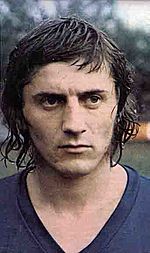Božo Bakota facts for kids

Bakota in 1978
|
|||
| Personal information | |||
|---|---|---|---|
| Date of birth | 5 October 1950 | ||
| Place of birth | Zagreb, PR Croatia, FPR Yugoslavia | ||
| Date of death | 1 October 2015 (aged 64) | ||
| Position(s) | Midfielder, Forward | ||
| Senior career* | |||
| Years | Team | Apps | (Gls) |
| 1970–1971 | NK Mladost Buzin | ||
| 1971–1980 | NK Zagreb | 195 | (53) |
| 1980–1986 | Sturm Graz | 167 | (86) |
| 1986–1987 | FC Fürstenfeld | ||
| 1988–1990 | Toronto Croatia | ||
| 1990–1991 | SV Wildon | ||
| Total | 362 | (139) | |
| International career | |||
| 1978 | Yugoslavia | 1 | (0) |
| *Club domestic league appearances and goals | |||
Božo Bakota (born October 5, 1950 – died October 1, 2015) was a talented Croatian footballer. He spent almost his entire professional career playing for just two clubs. These were NK Zagreb in Croatia and SK Sturm Graz in Austria. He started as a midfielder for NK Zagreb. Later, he became a forward for SK Sturm Graz. His exciting career lasted from 1971 to 1986.
Contents
Božo Bakota's Club Football Journey
Playing for NK Zagreb
Božo Bakota began his football journey at NK Zagreb. He played there for nine seasons. At that time, the club was working hard to become a top team. Early in his career, he played in one of NK Zagreb's most famous matches. This was a qualifying game against NK Osijek. The winner would get to play in the first league.
The first game in Osijek ended in a 0–0 tie. The second game was called "Great drama in Maksimir". It happened on July 19, 1973, at Maksimir stadium. So many people wanted to see it! A record 64,138 fans attended, which is still the stadium record today. Bakota came into the game later as a substitute. NK Zagreb won the match after a penalty shoot-out (4–3). This win allowed them to play in the 1973–74 season. They were now among the best clubs in the top division.
Bakota stayed with the club even after they were moved down from the first division. This happened at the end of the 1973–74 season. He helped them return to the top division in the following years. The 1974–75 season was Bakota's best with NK Zagreb. He scored 11 goals in 34 games. NK Zagreb finished second in their group that year.
The next season, NK Zagreb finally earned promotion to the first division. They won their group in the Yugoslav Second League. Bakota scored 6 goals in 17 games that season. His second-best season with NK Zagreb was 1977–78. He scored 10 goals in 28 games, playing as a starting midfielder. However, in 1979, the team was moved down again.
Success with Sturm Graz
After playing one more season with NK Zagreb, Bakota decided to join his former manager, Otto Barić. This was at the Austrian team SK Sturm Graz in 1980. He really shined there! He formed a strong attacking team with Gernot Jurtin. He helped the club finish second in the league in the 1980–81 season.
Bakota also became the league's top scorer in the 1981–82 season. He scored 24 goals in 36 games! In European competitions, his biggest success was reaching the quarter-finals of the 1983–84 UEFA Cup. This was with Sturm. They were eventually knocked out by England's Nottingham Forest. Bakota retired in 1986. He had scored a total of 86 goals in 167 Austrian Bundesliga games for Sturm.
His retirement from top-level football was short. He later played at regional levels for FC Fürstenfeld and SV Wildon. In 1988, he even played abroad in the National Soccer League with Toronto Croatia.
Božo Bakota's International Career
Bakota's great games at NK Zagreb caught the eye of the national team manager, Dražan Jerković. He was called up to the national team in 1978. Bakota played his only game for the national team on November 15, 1978. This was in a Balkan Cup match against Greece. Yugoslavia won 4–1 in Skopje.
About Božo Bakota's Life
From Graz to Buzin
Božo Bakota left a lasting impression at Sturm Graz. He was a very popular football player in that part of Austria. In the center of Graz, he owned a very popular cafe called "7". He lived in Buzin, a village near Zagreb, which was his hometown. Božo Bakota passed away on October 1, 2015.
 | Valerie Thomas |
 | Frederick McKinley Jones |
 | George Edward Alcorn Jr. |
 | Thomas Mensah |

